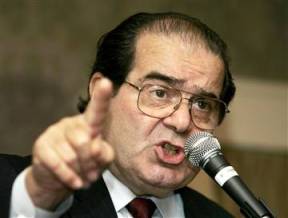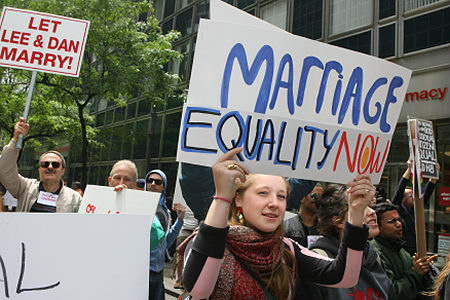Earlier this week, the prestigious and expensive King & Spalding law firm changed its decision to work for the House of Representatives and take up the charge of defending DOMA in court. Their announcement may not have major legal consequences for the gays; the specific lawyer that the House hired, Paul Clement, has resigned from the firm in order to take the case.
But regardless of the consequences, it’s still a major happening: while King & Spalding have declined to give an exact reason for pulling out, there seems little they could gain from the decision besides a clear conscience and peace of mind. The firm was noted for having better-than-average protections for its queer employees; one could speculate that this moral contradiction was a factor in their decision. But regardless of whether it was or not, there are those who believe this is about more than King & Spalding; this is about a shift happening in the legal universe, towards an understanding that “that sexual orientation is irrelevant to a person’s worth and that the law should reflect this judgment.” What a novel idea!
As those familiar with the raids and unrepentant institutionalized aggression towards gays that used to be a fact of life will remember, any kind of legal protections for gays used to be a pie-in-the-sky fantasy at best. As the NYT’s Dale Carpenter notes, as recently as 1961, legal institutions felt comfortable basically laughing in the face of any queer person who asked to have their rights defended.
In 1961, a Harvard-trained astronomer, Frank Kameny, stood alone against the federal government. Fired from his federal job simply for being gay, he wanted to petition the Supreme Court. But at a time when all 50 states still criminalized sodomy, even the American Civil Liberties Union declared it had no interest in challenging laws “aimed at the suppression or elimination of homosexuals.” Mr. Kameny wrote his own appellate brief; without comment, the court turned him away.
Obviously things have progressed, to a certain extent, since then. It’s been jerky and inconsistent progress; it is, after all, objectively bizarre that there are states in which gay people can marry openly, but can still be fired from their job for allowing other people know that in many others (and the US military! Sort of, still!). What changed?
Well, most basically, public opinion. Perhaps the most affecting thing I’ve ever read in law journalism is the sentence “Five justices — one of whom told a closeted law clerk that he had never met a gay person — dismissed the idea of a right to gay sex as “at best, facetious.” But you know, 50 years later, it’s really hard to not know a gay person, or to know that you know one. Even if you don’t want to. So while there’s a lot to credit the gays for – our unrelenting commitment to bringing our injustices to court over and over again until they were acknowledged, and our drive to have queers and allies elected to judicial and legislative position, for instance – this is also about larger progress, about our culture. Which we’re also responsible for changing, day by day.
Although the law can be mysterious and impenetrable, and although judges are tasked with interpreting the law according to a purely objective and perfectly impartial view, this isn’t a reality. Lawyers have to work on some personal understanding of right and wrong, and obviously these cultural definitions change to a degree – the most obvious example perhaps being the civil rights movement, with cases like Brown v. The Board of Education proving that the legal entity of our country can and will change its mind, if the people it serves prove to it that its previous thinking was wrong. The legal structure of the United States does exist to channel some sort of higher understanding of objective legal fact, but it also exists to answer to the conscience of the people. There can be no real argument against the fact that we define the major decisions of the Supreme Court as moral ones – Roe v. Wade, for instance, or Loving v. Virginia. When there is a major shift in either the moral or legal culture of America, the other one has to follow.
What’s interesting is that in this case, this fact, which seems fairly commonsense, is being disputed by none other than Supreme Court justices themselves. Justice Antonin Scalia, traditionally a fierce conservative, wrote in his dissenting opinion against the striking down of an anti-same sex marriage amendment in Colorado in 1996, that fighting the law was the work of “elitist legal corps disparaging ordinary Americans. The majority decision, he wrote, reflected “the views and values of the lawyer class from which the court’s members are drawn.”
 Does that sound familiar? Because it should, if you’ve followed the news stories on Sonia Sotomayor, or any other member of a minority group elected to represent a majority. It seems like any decision or opinion they express is always about their “views and values,” and is always somehow an affront on “ordinary Americans.” (Which, just to digress for a moment, is puzzling in itself – what is it exactly that Scalia identifies as being unordinary about the people whose opinions he disagrees with?) And of course, it goes without saying that the decisions made every year before 1996, ensuring that gay people could never live as full citizens – or even the decision made thesame year, the Defense of Marriage Act, which ensured that no gay couple could even hope to have their union recognized by the federal government – was done in service to “ordinary Americans,” and definitely wasn’t informed in any way by the “views and values” of the judges involved. Of course not.
Does that sound familiar? Because it should, if you’ve followed the news stories on Sonia Sotomayor, or any other member of a minority group elected to represent a majority. It seems like any decision or opinion they express is always about their “views and values,” and is always somehow an affront on “ordinary Americans.” (Which, just to digress for a moment, is puzzling in itself – what is it exactly that Scalia identifies as being unordinary about the people whose opinions he disagrees with?) And of course, it goes without saying that the decisions made every year before 1996, ensuring that gay people could never live as full citizens – or even the decision made thesame year, the Defense of Marriage Act, which ensured that no gay couple could even hope to have their union recognized by the federal government – was done in service to “ordinary Americans,” and definitely wasn’t informed in any way by the “views and values” of the judges involved. Of course not.
In the end, though, Scalia’s opinion on this will only last as long as Scalia does. And in the meantime, the opinions of the country will go on changing – and we can look forward to a future where our lives don’t have to be defended in court anymore.









Comments
If we’re not ordinary Americans, does that make us extraordinary Americans?
We’re like superheroes. SUPERLEZ TO THE RESCUE!
:)
Lots of stuff has changed in the last hundred years. Straight people didn’t used to worry about getting married for love, or thinking about having kids, or any of that, either. The law’s still catching up with that in a lot of ways. (Fun Fact: Ohio’s rape laws have now caught up enough to say that violent rape of your wife isn’t okay. Drugging her, however, is still fine.) But the frameworks are shifting, year by year. It’s coming one way or another. I just hope it starts moving a little quicker.
If we cannot get our rights thru the courts it’s time for another Stonewall uprising
I will follow Carmen Sandiego into any uprising.
Million Gay March in Washington DC if this doesn’t work out, what do you say?
THIS! I totally agree! But who will be OUR Martin Luther King Jr? Who will do an “I had a dream” speech for us queers?? I nominate someone from AS. ANYONE from AS. Anyone up for the nomination????
^ was me! I hate when I forget to log out of my wife’s account before posting a comment!
Ellen should be our MLK, and the gay I Have A Dream Speech would be hilarious.
Hey Obama! Be our Lyndon Johnson already!
I loathe Scalia
Yeah, pretty much agreed. I kind of think he’s like douche in a bag.
But, law, yey! For the most part…
Scalia and Thomas, they both repulse me.
I’m Australian, so I can attest that Scalia’s bad reputation is international. I would like to see Scalia in a debate with Kirby though — he was a judge on the Australian high court whom Scalia would call a judicial activist. He’s also gay, which makes this relevant.
Me too, plus his name sounds like a skin disease or something.
And then there was Herb Selwyn. He was the Mattachine Society’s lawyer in the 1950s and helped establish the first gay rights policy for the ACLU in 1964. He also made wallet-sized “Know Your Legal Rights” for gay people to carry around. And he was straight.
Is he still alive? Those sort of inspirational organizers are the people we need.
On an unrelated note your gravatar made me giggle. I like it!